Archive for December 17th, 2020
» posted on Thursday, December 17th, 2020 by Linda Lou Burton
The Day I Crossed the Andes in a Taxi
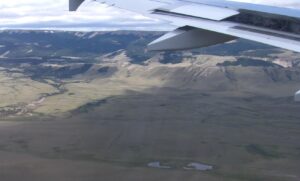 Christmas in Antarctica originally posted by Linda Lou Burton December 17, 2005 from Balmaceda & Puerto Chacabuco, Chile – I’d decided to keep my watch on Seattle time until I reached the ship. The plane landed in Balmaceda at 11:30 AM, coming in over green fields, little lakes, farmhouses, sheep. It was rural and sparse and, I soon discovered, windy. I asked the flight attendant to help me get my carryon bag down the steps but even on the ground I was caught sharply by the gusts.
Christmas in Antarctica originally posted by Linda Lou Burton December 17, 2005 from Balmaceda & Puerto Chacabuco, Chile – I’d decided to keep my watch on Seattle time until I reached the ship. The plane landed in Balmaceda at 11:30 AM, coming in over green fields, little lakes, farmhouses, sheep. It was rural and sparse and, I soon discovered, windy. I asked the flight attendant to help me get my carryon bag down the steps but even on the ground I was caught sharply by the gusts. 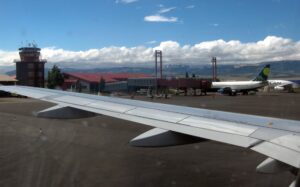
There was nothing near the airport, no town, no store, not even any houses. The baggage carousel was easy to spot in this tiny terminal, and I saw my fancy-schmancy circling as soon as I arrived. What I did not see was a uniformed Norwegian Cruise Lines official standing with a Voyage of Discovery sign. I wandered out into the main hallway, looking hopefully for something that would indicate a connection. “Taxi” I was offered, by several smiling hopefuls. I shook my head no and went to stack my luggage. Perhaps after a drink of water I could think what to do.
Then I heard my name.
I waved my hand and saw a young man, holding a slip of paper from which he was phonetically calling out the words he saw in print. “Leen-da?” “Yes! I’m Linda!” I yelled across at him and he immediately rushed to take my bags. He began pulling them towards the door until I put out my hand and ordered “Stop! Restroom!” He shook his head, puzzled. “No Eenglish,” he told me. “No Spanish!” I replied. I tried to think of a gesture that would indicate my need for a restroom stop. A woman on a nearby bench began to laugh as I continued “Restroom?” and he continued “No Eenglish.” She said something to him I did not understand and then he said to me “Bathroom?” I nodded, and he pointed around the corner. I left my bags on faith and went to pee.
When I returned my bags were gone. But there he stood, waiting to escort me out the door. I desperately needed a drink of water, but couldn’t bear to go through another round of misunderstandings. And where were my bags? He led me to a taxi at the curb, and opened the door. “What is your name?” I asked, extending my hand in handshake mode, “and where are we going?” Amazingly he seemed to understand, and offered his hand in return. “I am Marco,” he said.
We then began a game of Charades. “Where?” I pointed towards the road. “Ship!” he answered. “How far?” I asked, extending my hands apart. He shook his head. “How long?” I asked, tapping on my watch. “Two ow-hers,” he said, adding a distance in kilometers, which had no meaning to me.
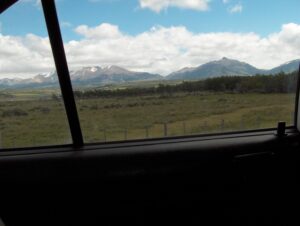 I was still curious about my bags and pointed to the trunk. “Can I have my black bag up front?” I asked. I don’t know if he understood, but he opened the trunk. My three bags were safely stowed, and I reached for the carryon, which he quickly retrieved and put into the back seat for me. I was beginning to feel a little more comfortable now, and after 30 hours with almost no sleep, welcomed any offered help. I settled in for the ride.
I was still curious about my bags and pointed to the trunk. “Can I have my black bag up front?” I asked. I don’t know if he understood, but he opened the trunk. My three bags were safely stowed, and I reached for the carryon, which he quickly retrieved and put into the back seat for me. I was beginning to feel a little more comfortable now, and after 30 hours with almost no sleep, welcomed any offered help. I settled in for the ride.
Marco had only driven two or three miles when he pulled the car to the side of the road and stopped. The highway was a smoothly paved two-lane, but there was no other traffic. “I wonder if anyone will ever find my body,” I thought, more resigned than worried. “I hope my brother remembers all the insurance policies and everything gets distributed correctly.”
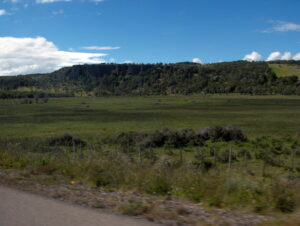 Marco turned to face me in the car, his face wrinkled in deep concentration. Then he gestured to the landscape and said “Big fire!” I looked around to see remains of tree trunks scattered on the hillsides, a sight of devastation like I had seen before. “Oh!” I nodded. “How long ago?” He looked worried at the question, and narrowed his eyes, thinking. Finally he answered “One hundred years!” I was excited at our progress, so asked another question. “What kind of trees? Trees? What kind?” More thinking, and then he smiled and shouted “El Pino!” “Pine trees!” I shouted back, laughing. We smiled at each other, satisfied. We’d had a conversation.
Marco turned to face me in the car, his face wrinkled in deep concentration. Then he gestured to the landscape and said “Big fire!” I looked around to see remains of tree trunks scattered on the hillsides, a sight of devastation like I had seen before. “Oh!” I nodded. “How long ago?” He looked worried at the question, and narrowed his eyes, thinking. Finally he answered “One hundred years!” I was excited at our progress, so asked another question. “What kind of trees? Trees? What kind?” More thinking, and then he smiled and shouted “El Pino!” “Pine trees!” I shouted back, laughing. We smiled at each other, satisfied. We’d had a conversation.
I took my camera from my pack and began snapping pictures of the countryside as we rode along. This seemed to please Marco, perhaps because I was interested in the place that was his home. He crossed the highway at a gravel turnout and opened the door for me. He grinned as he gestured towards a waterfall, splashing into a rushing stream. “Big fish,” he said. I snapped more pictures.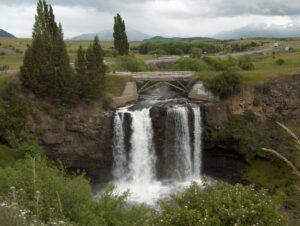
The landscape looked much like the wide open spaces of Wyoming to me, or eastern Washington state, and something very familiar was blooming everywhere. 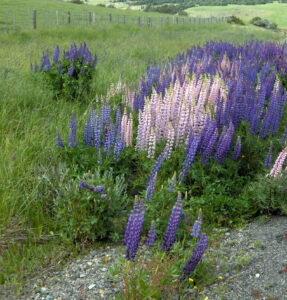 Lupine! Pinks and blues and purples and a soft cream color I’d never seen before. I tapped Marco on the shoulder and waved my camera as we passed a particularly beautiful field . “Flowers!” I said. He found a stopping place and let me out again. “So beautiful!” I said, “thank you.” Marco smiled.
Lupine! Pinks and blues and purples and a soft cream color I’d never seen before. I tapped Marco on the shoulder and waved my camera as we passed a particularly beautiful field . “Flowers!” I said. He found a stopping place and let me out again. “So beautiful!” I said, “thank you.” Marco smiled.
In about an hour we came to a town, identified by sign as Coihaique. This place I had read about in the tour materials. Maybe we were getting close? Marco drove through the downtown area, pointing out stores, circling the park where families were picnicking, children swinging. He stopped at a monument and pointed to the figures.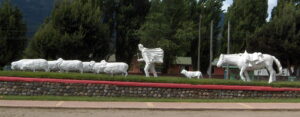
Was his English getting better? Or was my ear finally getting the Spanish? I’m not sure, but I seemed to absorb what was going on around me. At the gas station, I commented on his car. “Toyota!” I said. “I have a Toyota too.” “Good car,” Marco said.
We changed highways in Coihaique, and the landscape became steeper and more rugged, the road more challenging. Marco stopped at a lookout point high on the hill so that I could see the town laid out in the valley below. It reminded me of a place I once stood in Yosemite National Park. Now here I was, in the midst of the Andes.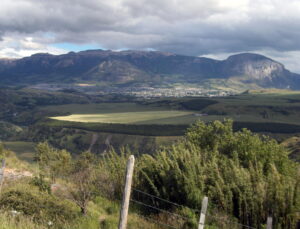
A few miles more down the road, Marco stopped to show me a rock outcropping that extended for several miles, high above the valley. “Great Wall,” he said. “Oh,” I finally understood, “the Great Wall, like China.” He nodded. Language is a great wall, I thought to myself. I wished that I could ask Marco about his family, his work, the places he had been. But I did not know how.
The road wound down now, and suddenly around a curve there was a road block. Marco pulled his taxi to the side of the road as the uniformed officer approached. Had we been speeding? I was not sure. Marco began to pull out papers and answer questions. All I could see was the elbow-length white leather gloves on the officer’s hands. Then he waved us on. “Normal?” I asked. “Sometimes,” Marco replied.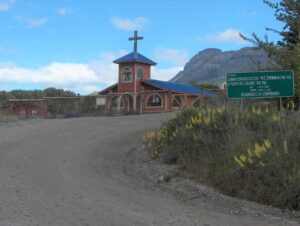
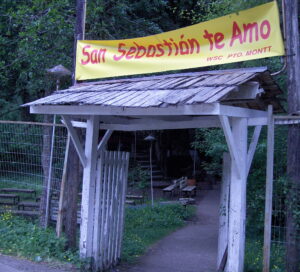 There was a river to our left. The river valley flattened and widened and campsites began to appear. I spotted obvious places for fishing and rafting. It reminded me of the Ocoee River in eastern Tennessee. “Simon River,” Marco indicated to me. “Big river.” We stopped at two more waterfalls, and two roadside altars. “San Sebastian,” Marco said, “saint of travelers.” I snapped more pictures.
There was a river to our left. The river valley flattened and widened and campsites began to appear. I spotted obvious places for fishing and rafting. It reminded me of the Ocoee River in eastern Tennessee. “Simon River,” Marco indicated to me. “Big river.” We stopped at two more waterfalls, and two roadside altars. “San Sebastian,” Marco said, “saint of travelers.” I snapped more pictures.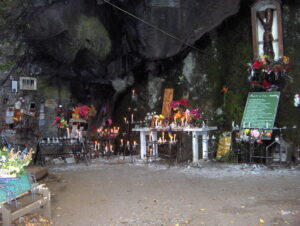
Another hour had passed, and we were approaching another town. Puerto Aisen, I saw on a sign. A large bridge loomed ahead. “Simon?” I asked, as we crossed over. “Aisen,” Marco said back. I spotted a fortified building on the left. “Jail?” I said, hoping he’d reply with the Spanish word. “Bad pipples,” he laughed.
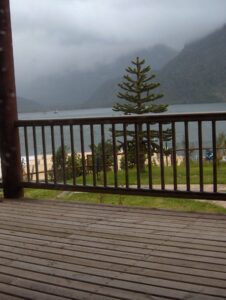 Now there was a large body of water on the right. “River?” I asked. “Ocean,” he said. Ocean! Was I almost to my ship? The answer was yes. In ten minutes more we drove into a small village surrounded by ice-capped mountains. Puerto Chacabuco, at last. Marco stopped the taxi in front of a beautiful building, wood and glass overlooking a narrow channel of water. There was no neon marquee, but I was sure I’d reached a destination of sorts. A handsome young man in a black uniform with golden epaulets met us at the door.
Now there was a large body of water on the right. “River?” I asked. “Ocean,” he said. Ocean! Was I almost to my ship? The answer was yes. In ten minutes more we drove into a small village surrounded by ice-capped mountains. Puerto Chacabuco, at last. Marco stopped the taxi in front of a beautiful building, wood and glass overlooking a narrow channel of water. There was no neon marquee, but I was sure I’d reached a destination of sorts. A handsome young man in a black uniform with golden epaulets met us at the door.
“Welcome Ms Linda! We have been expecting you! Your room is ready!” he said, in English. I turned to Marco. “Thank you so much, that was such a beautiful ride,” I said. Then I said to my host, “Has he been paid?” “Oh yes, the tour company has taken care of that,” my host replied. “He is free to go now.”
“Then please tell him how much I appreciate everything he did for me, please let him know it was very good, and please help me to give him a very good tip.” I pulled out all of the Chilean pesos I had and laid them on the counter. The host removed some bills and spoke to Marco in Spanish. Marco nodded as took the money. Then he shook my hand, smiled, and drove away.
Read More
Balmaceda, Chile – https://www.rutadelosparques.org/en/balmaceda/
Coyhaique, Chile – https://www.rutadelosparques.org/en/coyhaique/
Puerto Aisen, Chile – https://www.rutadelosparques.org/en/puerto-aysen/
Puerto Chacabuco, Chile – https://www.rutadelosparques.org/en/puerto-chacabuco/
» posted on Thursday, December 17th, 2020 by Linda Lou Burton
Jack Daniels and the Dunkin Donuts
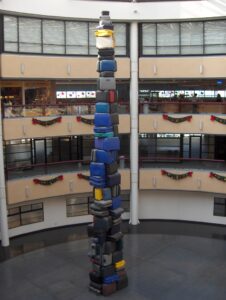 Christmas in Antarctica originally posted by Linda Lou Burton December 17, 2005 from Santiago & Puerto Montt, Chile –It took one hour and 25 minutes to get to the glassed-in box that housed Policio, Immigracion. I had my passport in my hand, a friendly I’m-not-dangerous expression on my face. “Have you been here before?” I was asked, as she flipped through my passport pages, which were as yet free of any mark. “No, my first time,” I replied.
Christmas in Antarctica originally posted by Linda Lou Burton December 17, 2005 from Santiago & Puerto Montt, Chile –It took one hour and 25 minutes to get to the glassed-in box that housed Policio, Immigracion. I had my passport in my hand, a friendly I’m-not-dangerous expression on my face. “Have you been here before?” I was asked, as she flipped through my passport pages, which were as yet free of any mark. “No, my first time,” I replied.
“Go pay. One hundred dollar.” I knew they would collect a hundred US dollars as I entered, I had three crisp fifty-dollar bills folded and ready in my passport case, one for good measure. But there was no sign anywhere indicating that it would be anywhere else but at the gate. “Where?” I asked, more than a little frustrated. She pointed to an area behind me, where there had been no line. I had observed none of the other passengers standing there during the long wait.
I trudged back across the nearly empty room, where three ladies merrily chatted away. “Pay here?” I asked. She had me slide my passport through the slot and then said “One hundred dollar.” I passed the money through. She stamped the passport, printed a receipt, and stapled it inside.
I trudged back to my original waiting line, ready to get aggressive about position. I edged my wheelie carry-on to the yellow line, like a runner at the starting gate. Go! I’m certain now I’m good. Passport to the glassed-in booth, receipt poking out the side. She flipped through again, glared at me. “You did not fill out the papers! Go back!” I had not noticed two small papers stuck inside, that asked for name and address and purpose of visit. “Can I please sit down to fill this out?” I asked, noticing a bench just a few feet past her. My knees were begging me to SIT. “NO! GO!”
I moved behind the yellow line again, first in place, determined not to let anyone ahead, hastily scribbling in the pre-measured boxes demanding name/address/married/single/widowed/divorced. ????? I thought. @#%$^&&#$^ I also thought. Now I’m up again! Go! Passport into the glassed-in booth, papers complete, fee paid. She slapped the stamp against the page and thrust it back to me. “Welcome to Chile,” she said.
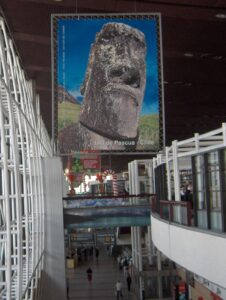 I saw a sign pointed to the baggage area, which wound through the duty-free shop. Now I’m in the main terminal, crowded with people pushing, shoving, hauling carts piled high with boxes, bags, children. I find a sign for Flt 601, and there below, tossed already onto the floor, are fancy and schmancy, waiting for me. No other luggage is in sight, long gone, to somewhere.
I saw a sign pointed to the baggage area, which wound through the duty-free shop. Now I’m in the main terminal, crowded with people pushing, shoving, hauling carts piled high with boxes, bags, children. I find a sign for Flt 601, and there below, tossed already onto the floor, are fancy and schmancy, waiting for me. No other luggage is in sight, long gone, to somewhere.
Good fortune! The carts are free, parked here and there. I grabbed a cart and piled my belongings together, all my stuff, at last! I headed for the gate. Or so I thought. There was a line of carts poised to go through, oh no I can’t believe it, CUSTOMS. I get in line again, leaning wearily against my cart. Fifteen minutes, edging forward, finally to the x-ray machines, a gentlemen is standing there, collecting papers. PAPERS? What papers? I ask. I did not see any papers! He handed me a sheet, “Here Senora, to declare,” he kindly stated. Many questions, name, address, widowed/divorced/married/single, did I bring plants or animals into the country? No. I handed him the completed form, and he stuffed it into a stack on the counter, never glancing at it.
“Go now,” he said, nodding at me. My bags disappeared into the x-ray machine, but I held possessively onto my cart.
On the other side, a sign in blue-and-white loomed overhead. Spanish, of course, but I could make it out. SMOKING CAUSES CANCER was the basic message. It pictured a person looking very ill. I pushed my now x-rayed baggage forward, past the waiting taxi drivers, onto the elevator, up to the Departures tier. Everything smelled of cigarettes.
And what did I see? LINES. Nacional. Puerto Montt, Balmeceda. I did not know what fate called next, but, I could not stand in line. I had to sit. I had to rehydrate. The vending machines asked for coins I did not have, could not read. I spotted stores, just around the corner. A bar! “Ginger ale?” I asked. “Si,” replied the bartender. “Ice?” I ventured, hopefully. “Ice,” he replied. I sat down. It was 3 AM by my watch, but 8 AM in Santiago. A mustached blond man at the next table ordered coffee, lit a cigarette.
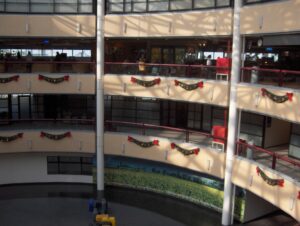 I sipped my ginger ale, watched the people passing by. On the wall, a sign advertised Jack Daniels Tennessee Whiskey. Hm! I recalled my tour of the place, my lunch at Bobo’s, in a tiny town in the Tennessee hills. The next store was a music store, plastered with posters of Jennifer Lopez. Just past that, Dunkin Donuts was the spot for a Chilean breakfast.
I sipped my ginger ale, watched the people passing by. On the wall, a sign advertised Jack Daniels Tennessee Whiskey. Hm! I recalled my tour of the place, my lunch at Bobo’s, in a tiny town in the Tennessee hills. The next store was a music store, plastered with posters of Jennifer Lopez. Just past that, Dunkin Donuts was the spot for a Chilean breakfast.
“No matter how far we go, we’re never very far away,” I thought.
Fortified now. Back to the lines. I handed the ticket agent my passport, she asked my destination. “I do not know,” I replied, ‘but my name should be in your computer somewhere.” I explained about the tour company, the delay, the arrangements. She called for a supervisor. They talked for a while, in Spanish of course. I waited.
Then she began to type. “You will come back later to see your gate,” she said, “it is too early now to know.” “Then you see my name?” I asked. “Si.” “Where am I going?” I asked again. “Balmeceda,” was the answer, “at 12:55.” She pasted new tags on my luggage, threw it onto a belt. Suddenly, I had a boarding pass in my hand.
I pushed my cart outside into the Santiago air. It was sunny with smog, and pleasantly warm. “Santiago,” I thought, “is the same latitude as Birmingham, Alabama. So, this would be like a Birmingham day in June.” More or less. I snapped a few pictures of the rounded brown hills and went back inside.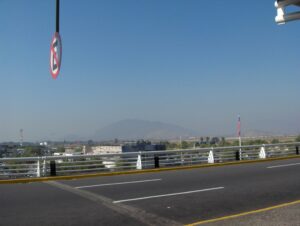
Now to stay awake until noon. My head was drooping. I decided to eat. Back to the café, a milkshake now, a fruit tart. How to pay? How to tip? I blundered through.
Security at Santiago was easy. Finding my gate was easy. Or, is everything routine now? Seated, with two hours to wait, I fell asleep. But still, I heard the call. Onto the plane and a window seat! A couple to my right. She was so friendly, now I know I cannot sleep. She asks where I am going, listens to my tale. “We are going to Puerto Montt,” she said. “That is my home. We were delayed in Miami ourselves, our luggage lost. We’ve been filling out papers.” Now I knew, we were kin! “What were you doing in Miami?” I asked. “Oh, we live in North Carolina,” she replied. “My husband is from Alabama.” He smiles and nods at me. Maybe our paths have crossed before, in a grocery store, at a football game? Small world thoughts again.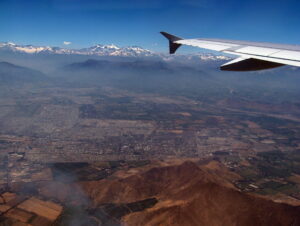
The sky was clear as we left the ground, and suddenly I saw the city of Santiago below. My seatmate leaned to look with me, described the city. She knew the route, pointed out the mountains, the lakes. Osorno Volcano I recognized from the pictures I’d seen. She verified I was correct.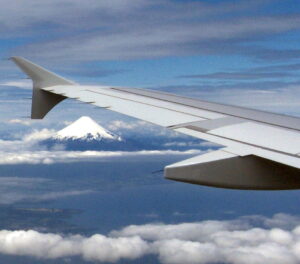
The plane glided over lakes, water, resorts, boats, houses, trees. We were on the ground and my friendly companions departed. “Have a wonderful Christmas with your sister,” I said.
“Good luck in Balmaceda,” they said to me. “We hope you catch your ship.”
» posted on Thursday, December 17th, 2020 by Linda Lou Burton
Fatal Mistake
Christmas in Antarctica originally posted by Linda Lou Burton December 17, 2005 from Santiago, Chile – The tiny screen in front of me was my lifeline. Set on GPS, it showed my location as if I were looking from the cockpit, with the jagged peaks of the Andes on my left. Other screens were map-like, with city-dots identifying the political name for what was there, our tiny-toy plane an imaginary figure above the world, creeping south. Occasionally the screen flipped to a statistics page. Velocidad. Altura. An English menu was offered but it took so long to download I decided to stick with the Spanish version. I determined we were flying at 35,000 feet with a ground speed of 508 mph.
I jotted down map-names. Trujillo. Rio Branco. Cuzco. Arequipa. Arica. Huancayo. Juliaca. La Paz. Iquique. Antofagasta. Galapagos Islands. Machu Picchu. Ascencion. Vina del Mar. Oruro. Totori. Calama. Salta. Pachacamac. Trinidad. Sucre. Copiapo. Mumahuaca. Concepcion. Cordoba. Santiago. Maldonado. Balmeceda.
I believe Balmaceda was a name Par said to me as a possible destination after Santiago. But he was not sure. I must wait and see.
They served food again after our stop in Lima. An omelet, tasty and hot, some fruit. A cinnamon cake. “You can have my melon,” Sofia said. “If I can have your grapes.” It was a perfect swap. The man on my left was sleeping. But Sofia and I talked. She was born in New York, to Argentine parents. Her father worked for Citibank so was transferred twelve times as she grew up. Elementary school in the Philippines, high school in Greece. “I followed my ex-boyfriend to LA,” she told me, “and now I do not want to leave. But I have so many choices.” “Where is your ex-boyfriend?” I asked. “He’s moved on,” was the reply.
I could not sleep. My brain was still on Seattle time. It was 10 PM when we left Lima, with three more hours to fly. Midnight, and my Friday became my Saturday, but outside it was already light.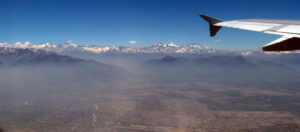
I finally made it to Santiago, 48 hours behind schedule. I waited till the plane was nearly empty before I started down the aisle. It was 2 AM on my watch, 7 AM on the ground. Next step, get in line at Customs. Fatal mistake, waiting so long to leave the plane. There were at least 300 people ahead of me. I wished I’d slept. I wished I had water. I wished for a chair.
My next invention, a fancy-schmancy travel bag on wheels with a pop-down seat.
